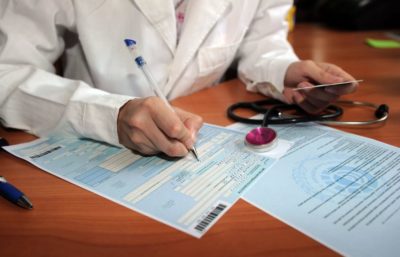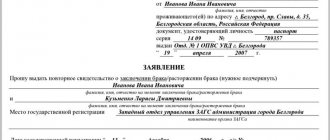Is it possible to do this?
Article 183 of the Labor Code of the Russian Federation states that days of treatment must be paid for with temporary disability benefits.
Company management should not allow employees to enter the workplace in cases where there is a doctor’s certificate. For failure to comply with such requirements, a fine may be imposed on the organization in accordance with Article 76 of the Labor Code of the Russian Federation. In such cases, the existence of an agreement, and even the consent of the worker, does not matter.
Attention. Performing work duties during this period is a violation of the employee’s rights in any possible situation and, as a rule, leads to negative consequences for both the company and the employee.
When starting to work with outstanding sick leave, the worker must remember the following:
- the amount of the benefit may be reduced in cases of violation of the treatment regimen;
- hours spent at work cannot be paid.
Working while on sick leave at the employee’s initiative
It is no secret that sick leave benefits are less than wages for the same time. Therefore, there are often cases when employees themselves want to go to work with an open sick leave.
Is this always good for the employer? Of course not. Primarily due to compliance with safety precautions and sanitary standards.
If something happens to an ill employee on the job, the incident may be classified as a work-related injury. If it is proven that the employee was already on sick leave, then we will talk about compensation by the employer for harm to the employee’s health, and not about the usual payment for temporary disability.
If an employee has some kind of contagious disease, the employer, by allowing the sick person to work, puts the entire team at risk and risks the production process.
Is it possible to prevent a sick employee from working? There are two directly opposite approaches.
Find out what risks there are when working on sick leave in ConsultantPlus. If you don't have access, sign up for a trial demo access. It's free.
Approach 1
It is impossible to prevent an employee who is eager to work from entering the workplace. In Art. 76 of the Labor Code of the Russian Federation lists all the circumstances when dismissal from work is possible, and simply the presence of an unclosed sick leave for an employee is not stated there. For official non-admission there must be a medical report drawn up in the appropriate manner. Sick leave is not considered as a medical certificate. The employer also does not have the right to require an employee to undergo a medical examination if this is not provided for his position by law and local regulations. From this point of view, it turns out that since the employee has left, let him work.
Approach 2 (explained by Rostrud specialists)
A sick employee may not be allowed to work. We must use the fact that the sick leave is not yet closed. That is, the sick person has days of absence from work, for which the justification of the absence has not yet been confirmed. Then, when the employee leaves, you need to ask him for an explanation for the days he missed earlier. If an employee shows unpaid sick leave, give him a written warning about the need to comply with the sick leave regime and inform him that violation of the sick leave regime will result in incomplete payment of sick leave and difficulties with payment of wages for days worked. If this does not help, you need to document the illness of the sick employee with free-form reports and send them to the medical institution that issued the sick leave. This will be a lesson to the employee and will provide an opportunity not to pay sick leave benefits in full.
Is it considered non-compliance with the law?
Going to work and, accordingly, appearing at the workplace while on sick leave should be considered as non-compliance with the treatment regimen and regarded as a reason for reducing the disability payment to an amount not exceeding the minimum wage for a full calendar month (Article 8 of Law No. 255-FZ).

As practice shows, such violations are not always reflected in certificates. In such situations, the company management itself may consider the worker’s actions as a violation and have grounds for reducing the amount of payment. Evidence must be a work hours book, magnetic entry/exit devices, or documents signed by employees during the sick leave period.
Is it possible to go to work while on sick leave?

A sick leave certificate is issued to a person when he is temporarily unable to work due to illness.
Until its closure, the employee must strictly adhere to the treatment regimen prescribed by the doctor. Going to work while on sick leave is considered a gross violation of employee rights.
According to the law, an employer does not have the right to pay an employee sick leave and pay wages at the same time.
If social security authorities find out that an employee went to work while on sick leave, they will impose a fine on the organization’s management.
Benefit or salary – what is paid?
When the question of calculating payments arises, you need to understand that the employee will not be able to simultaneously receive disability benefits and wages, since one is intended to compensate for the other.
Most often, benefits are paid , since the employer is obliged to pay it for the entire period of sick leave (Article 183 of the Labor Code of the Russian Federation). Presence at the workplace during the period of valid sick leave does not cancel the conclusion of the attending physician’s incapacity for work.
In addition, the fact that a sick leave certificate is issued confirms the employee’s release from work during a given period, but does not prohibit his voluntary presence at the workplace.
If management allows an employee to work during illness, employees often write a letter of return to work of the following type:
“Due to deteriorating health, I was issued sick leave No.... for the period from 04/05/2017 to 04/13/2017. In fact, I was present at work on April 7, 8, 10, 2021.
Please consider these 3 days as working days and calculate payment for them based on the salary. I ask you to consider the remaining days as sick days and pay benefits according to the certificate of incapacity for work.”
This statement can be considered an additional document, because according to Article 100 of the Labor Code of the Russian Federation, internal labor regulations, as well as paragraph 3 of Article 37 of the Constitution of the Russian Federation, the very fact of labor activity is considered the basis for the calculation and payment of wages.
IMPORTANT! When preparing a report card, attendance marks the days you go to work, and the remaining days – sick leave days. The days of absence due to illness are noted on the sick leave certificate.
In cases where the days of return to work were scattered throughout the entire period of sick leave, in addition to the slip, in the calculation of benefits it is necessary to explain for which specific days the accrual must be made.
Such payments are considered justified, since they go to pay for work activities, so there should not be any difficulties with inclusion in tax expenses.
A sick employee returns to work: should he pay wages or allowances?
Salary or benefits? In any case, the employer must choose one of these options. It is impossible to accrue both compensation for sick leave and salary at the same time, since according to Federal Law No. 255 of December 29, 2006, one payment is intended to replace the other. That is, during the period when the employee is deprived of labor income, he receives benefits. These payments are mutually exclusive.
A number of employers are confident that benefits should be accrued. They operate with the following arguments:
- Article 183 of the Labor Code of the Russian Federation clearly states that the employer is obliged to pay benefits for the entire duration of sick leave, the duration of which can only be determined by a doctor. Only a specialist can accurately determine whether a person is able to work. Therefore, the fact that an employee goes to work while on sick leave does not at all indicate his ability to work.
- Sick leave implies release from work: the employee has no obligation to go to work. Voluntary work, when a person comes to work of his own free will, is not required to be paid by the employer.
Question: Is it necessary to pay an employee working on a rotational basis a benefit for days of temporary incapacity for work that fall during the period of rest between shifts? View answer
All these arguments exist, however, despite them, the employer is obliged to pay wages. This is justified as follows:
- An employee’s work cannot be called completely voluntary. This is due to the fact that the sick leave period still remains a working period. This is how it is designated in the local labor regulations. This is not a vacation or a day off. Being on sick leave, according to paragraph 3 of Article 5 of the Federal Law No. 323 of November 21, 2011 and Article 3 of the Labor Code of the Russian Federation, cannot be a ban on work. The worker has the right to decide for himself whether he will use days of forced rest.
- According to paragraph 3 of Article 37 of the Constitution and Article 56 of the Labor Code of the Russian Federation, the employer is obliged to pay the employee a salary for work. A worker who performs his job duties must receive appropriate remuneration. The obligation to pay wages is also established by Articles 22 and 129 of the Labor Code of the Russian Federation.
ATTENTION! Salaries during the period of sick leave are calculated at the standard rate. This is due to the fact that in this situation the employee does not work overtime. His work complies with the company’s internal work routine and standards. This rule is specified in Articles 107, 152-153 of the Labor Code of the Russian Federation.
What to do if an employee left the worksheet ahead of schedule?

If, due to various circumstances, an employee is forced to go to work a day before the end of sick leave, the employer may recognize the reason for leaving as valid and not initiate a legal mechanism to reduce benefits. In agreement with management, an employee can write a statement of this kind:
“Having a certificate of incapacity for work No...., for the period from March 25 to April 5, I actually started work on April 4. In connection with this situation, I ask you to consider 4.04 as a working day.”
In the timesheet, indicate the employee’s attendance on this day, and in the certificate of incapacity for work in the column “Benefits are due for the period: …” do not include the dates 4.04 and 5.04 for payment of benefits.
Is it possible for an employer not to allow a subordinate to work who is on sick leave?
The deputy head of the Federal Service for Labor and Employment, I. I. Shklovets, competently advised the optimal solution for such a situation. A manager may not allow a subordinate to work. He must convince the employee not to violate the sick leave regime. In this situation, there are weighty arguments on the side of the manager: during illness, if a certificate of incapacity for work is issued, the salary is not accrued, and going to work is a violation of the regime, which is fraught with a reduction in benefits.
If, after spending several days on sick leave, a subordinate goes to work without providing a certificate of incapacity for work, then he can be required to provide a written explanation of the reason for his absence on the previous days, in accordance with Article 193 of the Labor Code of the Russian Federation. After receiving an explanation, the employee must be given a written notice of the need to comply with the regimen established by the doctor and not be allowed to perform duties. When reading the document, the subordinate must sign it.
If this measure also did not have an impact, then it is worth drawing up a report on violation of the treatment regimen, which must be sent to the medical organization.

Article 22 of the Labor Code of the Russian Federation obliges the employer to provide the employee with work under the conditions provided for in the employment agreement. But within the framework of labor legislation (according to Article 57 of the Labor Code of the Russian Federation), the employer is also obliged to provide compulsory social insurance. Based on the provisions of the Labor Code, the employer must prevent a subordinate from going to work if the latter is sick.
What if your boss forces you to work during treatment?
Obviously, it is impossible to force an employee to go to work on sick leave (Article 5.27 of the Code of Administrative Offenses of the Russian Federation). If controversial situations arise in the area of forced work, a worker undergoing treatment may contact the labor inspectorate with a statement (complaint), which may lead to further imposition of penalties on the employer.
Many are afraid of possible dismissal if they refuse to go to work, but here too the law is in favor of the sick person. Article 81 of the Labor Code of the Russian Federation states that it is impossible to dismiss an employee during a period of temporary incapacity for work . Forcing the employer to sign the employee's resignation letter, in this case, may serve as an appeal to the prosecutor's office.
If the manager’s call was more of an informal request, backed by a promise of reward, employees sometimes go to work. As a reward, the employer may provide a bonus or time off.
Results
The answer to the question whether it is possible to go to work on sick leave is generally affirmative. In practice, such situations are common. The procedure for paying for work during sick leave is quite complex, since it is necessary to simultaneously comply with several prohibitions and restrictions related to the inability to pay both benefits and wages for the day worked on sick leave.
We will talk about the nuances of calculations and “secret moves” for an accountant when paying for an employee’s sick leave in the next article.
You can find more complete information on the topic in ConsultantPlus. Free trial access to the system for 2 days.
How to register and pay for days worked
On the timesheet, one day is marked either as worked or as unworked. You cannot put two codes in one cell at the same time. If the employee and management agree, the time sheet marks the days when the employee worked as attendance, and when he was undergoing treatment as days of incapacity. When submitting data for payment to the Social Insurance Fund, the period for which compensation for lost earnings due to illness or injury is due is specified.
Read more: What payments are included in the calculation of sick leave
We warn you: this option may raise questions among officials. They are allowed to reduce the amount of benefits due to violation of the regime, even if the attending physician does not give any mark. And as judicial practice shows, the law is on the side of the FSS.
There is another way - to agree in advance with your subordinate how work will be paid during sick leave, pay the certificate of incapacity for work in full, and pay the agreed amount for the time worked. For example, in the form of financial assistance.
Ways to prove violation

As a rule, the company does not seek to convict its employee of going to work while temporarily incapacitated. This is beneficial for them, because if a person is on sick leave, the Social Insurance Fund pays him for this time. But wages will not be accrued, because these payments cannot be combined.
The right to sick leave: what a sick employee who is forced to work should know
Guests
Vladimir Karacharovsky Associate Professor, Department of Applied Economics, HSE
Andrey Zvonkov, general practitioner
Olga Arslanova:
And if you get sick, you shoot yourself. This recommendation...
Petr Kuznetsov:
...They were underfed with formula, for example.
Olga Arslanova:
...can you call it a recommendation? President Putin gave it to his subordinates. If they didn't get the flu shot and got sick. A current offer for ordinary Russians as well.
Petr Kuznetsov:
Agree, employers in our country do not like sick leave. Various studies show this. And here is one of them.
Olga Arslanova:
Yes, let's look at what is just relevant during the flu and cold season, which is now beginning...
Petr Kuznetsov:
Frosts have just reached Moscow.
Olga Arslanova:
...And we, too, are actively sneezing in our editorial office, by the way. Experts have calculated that only 51% of Russian companies offer people who are sick to take sick leave and quietly recover at home. Approximately 21% of employers allow a sick person to stay at home for 3 days and not take sick leave.
Petr Kuznetsov:
ABOUT! Thanks to them for this! They allowed me to take sick leave, mmm.
Olga Arslanova:
3 days without sick leave, by the way. But many employers expect or require sick employees to continue working. Can you imagine? Almost 13% of companies do not care whether you are sick or healthy. Come and work. Infect.
Petr Kuznetsov:
In terms of? But he comes - and everyone falls asleep.
Olga Arslanova:
But there is no one. There’s no one to put in place, you know?
Petr Kuznetsov:
Temporary staff.
Olga Arslanova:
If you can walk, come.
Petr Kuznetsov:
Temporary staff. In Europe it is used...
Olga Arslanova:
No, no. In these 13% of companies.
Petr Kuznetsov:
There are many unemployed, but no temporary staff.
Olga Arslanova:
5% of companies (we move on to the next ones, this is in the minority), 5% of companies allow not to issue a sick leave, provided that the employee simply works at home. In between temperatures of 40.
Petr Kuznetsov:
On a lathe.
Olga Arslanova:
2.5% are still ready to sign a sick leave, this is a compromise option, but in return they expect remote work from home.
Petr Kuznetsov:
Fine. And we are waiting for our expert. This is Vladimir Karacharovsky, associate professor of the Department of Applied Economics at the Higher School of Economics. Now he's in touch with us in a second. In the meantime, the survey. Are you always allowed on sick leave? "Yes or no". We'll find out very soon. Vladimir, hello.
Olga Arslanova:
Hello.
Vladimir Karacharovsky:
Hello.
Petr Kuznetsov:
What does “allowed to take sick leave” mean? 51%. Is it possible, under the same labor code, to force a sick person to continue working?
Vladimir Karacharovsky:
Well, of course not. This is a very strange point of view of the employer and the position of the employer. If you are sick and your doctor has officially diagnosed you with this disease, then you do not owe anyone anything. And the phrase “the employer prohibits” or “allows” or “does not allow” to get sick is, of course, absurd. Another thing is that, as we have said many times, the employer has many ways to make your life at work miserable if you do not listen to him. And in this sense, this survey, apparently, should be understood in exactly this way. What if you, nevertheless, decide according to your legal right to get sick, then the employer will then pay you off. Which, of course, is unacceptable.
Olga Arslanova:
Vladimir, but still, many employees themselves prefer to negotiate somehow and not take sick leave. Because – what does sick leave mean? This means: you need to go to the doctor and make some kind of diagnosis, document this disease, and there it may be a common cold. This time. And two - then you get less money while you are sick. And the sick leave must be closed, and you will lose money. That is, to what extent are employees willing to take sick leave?
Petr Kuznetsov:
Wait, maybe you don’t always lose? This probably depends on the sick leave itself.
Olga Arslanova:
I know that many of my colleagues themselves prefer not to take any sick leave, but to work until you drop.
Vladimir Karacharovsky:
It's clear. Everything you have listed is precisely a characteristic of a market economy in its wildest forms. This is when the economy works to squeeze the juices out of the population, and it can only be effective in the short term, such an economy. Sick leave can actually lead to lost wages. If, for example, you have little experience. If you have up to 5 years of experience, as far as I remember, up to 60% of your salary is paid. Or if your salary, for example, was gray for a long time. Let's say you've only been working on a white salary for a year. Sick leave is accrued for the previous 2 years. Then, of course, for the year in which you had a gray salary, you will only be accrued sick leave according to the minimum wage in your region. And this is a tangle of such problems. Workers often lose money, firstly, because they have little experience. In this case, they are really not protected. Young people, for example, are under attack here. Then, if the employee actually has a significant part of his salary that is gray or in the near past it was gray, then he also loses. That is, in a sick leave, as if in a mirror, all the problems of our economy appear. There is no official salary, sick leave depends on length of service, etc. And so, in principle, if you have more than 8 years of experience and your salary is normal, then in general you have nothing to lose. Besides this point, if the employer doesn’t like the fact that you are absent from the workplace, then he can put pressure on you.
Petr Kuznetsov:
Vladimir, tell me, what about all these vaccinations at work, medical examinations once, twice a year? Or are only large companies doing this because they value their staff?
Vladimir Karacharovsky:
No, but it’s really mostly large, state-owned companies that do this. That is, everything that we are talking about, for example, the need for vaccination, is all to a large extent when the employer supports it, these are cases when we are talking either about the public sector, or we are talking about large transnational companies operating in Russia , or large Russian companies.
Olga Arslanova:
It's clear. Most don't have this.
Vladimir Karacharovsky:
Yes, if we leave the public sector and move into medium and small businesses...
Olga Arslanova:
...what is there to talk about. Vladimir, a very important point. Here is a person who got sick, I have the right, he went and wrote out a sick leave, for a week, two, three I sit and lie on sick leave. And someone is working for me. But how are the rights of those who remain respected? After all, they won’t get paid for it.
Vladimir Karacharovsky:
This situation has existed for a long time. But really, if, firstly, the mechanism of labor organization in the company should be ensured in such a way that there should be substitutions. If this causes someone to stay and work overtime, then they should be paid double the wages. If the person who replaces, for example, has a time-based bonus payment system, then he should receive additional money for these replacements. In general, in an enterprise, again this is a characteristic of our phase of economic development, it should not be the case that one person leaves and the whole process stops. This means that the employer saves a lot on employees. If there are no such savings and we have, I don’t know, not 50 responsibilities assigned to one employee, but 5-7 employees for these 50 responsibilities, then there will be no problems. Nobody will even notice it.
Olga Arslanova:
Thank you.
Petr Kuznetsov:
Thanks a lot. Vladimir Karacharovsky. Andrey Zvonkov, a general practitioner, is with us now. Hello, Andrey Leonidovich.
Olga Arslanova:
Good afternoon.
Andrey Zvonkov:
Good afternoon.
Olga Arslanova:
Tell me, is employees who suffer their colds on their feet because they are afraid of quarreling with their employer a problem for public health? Or is this normal practice, and nothing to worry about, not dangerous?
Andrey Zvonkov:
Of course it's a problem. This is always a problem. Because the employer who requires his employees to go to work regardless of their health status is a criminal. Do you understand? You can't do that. An ordinary, normal employer... Well, I know simply, I worked in a clinic where our boss constantly said that if you didn’t feel well, you don’t even have to take sick leave, call, report that you’re sick, and don’t let us down . You will come and infect the department, you will infect the sick, why is this necessary?
Petr Kuznetsov:
Nevertheless, it feels like this very combination of “sick leave” has remained somewhere in the past. Is it possible to say that it is simply not popular now? Either the employer forces you to continue working, or the employee himself, in fact, does not want to complete all these documents until the last minute.
Andrey Zvonkov:
You see what the matter is... Our current situation is structured in such a way that sick leave is not paid for by the employer. We know that our social security system pays for it. Therefore, in principle, the employer is not interested in a person going on sick leave, for only one simple reason: that he will lose the employee for a certain time, i.e. the work will not be done.
Olga Arslanova:
It's clear.
Petr Kuznetsov:
Thank you. Unfortunately, time. Andrey Zvonkov, general practitioner. Voting results. They asked: are you always allowed on sick leave? “Yes” 25%, “no” 75%. Which, in fact, confirms the infographic we started with










